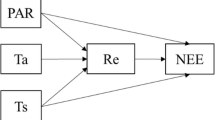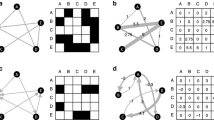Abstract
Government agencies often rely on repeated discriminatory price auctions to procure ecosystem services from private landowners despite limited evidence on this mechanism’s performance. This study presents an agent-based model of a repeated discriminatory price procurement auction in which the auctioneer informs bidders of their respective bid outcomes and the average price of successful bids after each round. The model introduces a new learning algorithm through which bidders adapt to these price signals. Simulations are used to compare the mechanism’s performance to an equivalent uniform (second) price auction, providing several findings. First, the performance of the discriminatory mechanism tends to deteriorate over time relative to the uniform mechanism as bidders learn. Second, minimal changes in bidders’ price expectations have a large influence on the relative performance of the mechanisms. Third, the discriminatory mechanism maintains high levels of efficiency and cost-effectiveness over time if bidders have highly heterogeneous opportunity costs and neutral or moderately low price expectations. Fourth, the system’s price paths have a high degree of stochasticity and path dependency, making it difficult to predict a single realisation’s trajectory. Based on these findings, we provide several suggestions regarding auction design.










Similar content being viewed by others
References
Bower J, Bunn D (2001) Experimental analysis of the efficiency of uniform-price versus discriminatory auctions in the England and Wales electricity market. J Econom Dynam Control 25(3–4):561–592
Brown LK, Troutt E, Edwards C, Gray B, Wanjing Hu (2011) A uniform price auction for conservation easements in the Canadian prairies. Environm Resour Econom 50(1):49–60
Cason TN, Gangadharan L, Duke C (2003) A laboratory study of auctions for reducing non-point source pollution. J Environm Econom Manag 46(3):446–471
Cason Timothy N, Gangadharan L (2005) A laboratory comparison of uniform and discriminative price auctions for reducing non-point source pollution. Land Econom 81(1):51–70
Clean Energy Regulator. About the emissions reduction fund. Accessed 10 May 2021. http://www.cleanenergyregulator.gov.au/ERF/About-the-Emissions-Reduction-Fund
Clean Energy Regulator. Auction Results. Accessed 10 May 2021. http://www.cleanenergyregulator.gov.au/ERF/auctions-results
Clean Energy Regulator. Choosing a project type. Accessed 10 May 2021. http://www.cleanenergyregulator.gov.au/ERF/Choosing-a-project-type
Clean Energy Regulator. Guidelines for emissions reduction fund auction 12. Accessed 10 May 2021. http://www.cleanenergyregulator.gov.au/DocumentAssets/Pages/Guidelines-for-Emissions-Reduction-Fund-Auction-12.aspx
Cliff D, Bruten J (1997) Zero is not enough: on the lower limit of agent intelligence for continuous double auction markets. Techl Rep HPL-97-141, HP Technical Report
Erev I, Roth AE (1998) Predicting how people play games: Reinforcement learning in experimental games with unique, mixed strategy equilibria. Am Econom Rev pp 848-881
Gode DK, Sunder S (1993) Allocative efficiency of markets with zero-intelligence traders: market as a partial substitute for individual rationality. J Political Econom 101(1):119–137
Hailu A, Rolfe J, Windle J, Greiner R (2010) Auction design and performance: an agent-based simulation with endogenous participation. In: International Conference on Agents and Artificial Intelligence, pp. 214-226. Springer, Berlin, Heidelberg
Hailu A, Schilizzi S (2005) Learning in a basket of crabs: an agent-based computational model of repeated conservation auctions. In: Nonlinear dynamics and heterogeneous interacting agents, pp. 27-39. Springer, Berlin, Heidelberg
Hailu A, Schilizzi S, Thoyer S (2005) Assessing the performance of auctions for the allocation of conservation contracts: theoretical and computational approaches. Am Agricultural Econom Assoc (New Name 2008: Agricultural and Applied Economics Association), no. 378-2016-21416
Hailu A, Thoyer S (2007) Designing multi-unit multiple bid auctions: an agent-based computational model of uniform, discriminatory and generalised vickrey auctions. Econom Record 83:S57–S72
Md Sayed I, Tisdell JG (2016) An agent based analysis of combinatorial bidding for spatially targeted multi-objective environmental programs. Environm Resour Econom 64(4):537–558
Md Sayed I, Atakelty H, Lindner RK (2012) The effect of bidder heterogeneity on combinatorial conservation auction designs. Environm Resour Econom 53(1):137–157
Khanna M, Ando AW (2009) Science, economics and the design of agricultural conservation programmes in the US. J Environm Plan Manag 52(5):575–592
Klemperer P (1999) Auction theory: a guide to the literature. J Econom Surv 13(3):227–286
Klemperer P (2002) What really matters in auction design. J Econom Perspect 16(1):169–189
Uwe L-L, der Hamsvoort Van, Carel, (1997) Auctioning conservation contracts: a theoretical analysis and an application. American J Agricultural Economs 79(2):407–418
Milgrom P (2004) Putting auction theory to work. Cambridge University Press, UK
Neugebauer T, Selten R (2006) Individual behavior of first-price auctions: the importance of information feedback in computerized experimental markets. Games and Econom Behav 54(1):183–204
Ockenfels A, Selten R (2005) Impulse balance equilibrium and feedback in first price auctions. Games and Econom Behav 51(1):155–170
Reeson, AC, Tim W, Stuart (2012) Are auctions for ecosystem service provision likely to suffer with repetition? 14th International BIOECON Conference
Reichelderfer K, Boggess WG (1988) Government decision making and program performance: the case of the conservation reserve program. Am J Agricultural Econom 70(1):1–11
Rolfe J, Schilizzi S, Boxall P, Latacz-Lohmann U, Iftekhar S, Star M, O’Connor P (2018) Identifying the causes of low participation rates in conservation tenders. Int Rev Environ Resour Econom 12(1):1–45
Rolfe J, Whitten S, Windle J (2017) The Australian experience in using tenders for conservation. Land use policy 63:611–620
Roth AE, Erev I (1995) Learning in extensive-form games: experimental data and simple dynamic models in the intermediate term. Games and Econom Behav 8(1):164–212
Schilizzi, Steven GM (2017) An overview of laboratory research on conservation auctions. Land Use Policy 63 (2017): 572–583
Schilizzi S, Latacz-Lohmann U (2007) Assessing the performance of conservation auctions: an experimental study. Land Econom 83(4):497–515
Shoemaker R (1989) Agricultural land values and rents under the conservation reserve program. Land Econom 65(2):131–137
Selten R, Abbink K, Cox R (2005) Learning direction theory and the winner’s curse. Express Econom 8(1):5–20
Wichmann B, Boxall P, Wilson S, Pergery O (2017) Auctioning risky conservation contracts. Environ Resour Econom 68(4):1111–1144
Author information
Authors and Affiliations
Corresponding author
Additional information
Publisher's Note
Springer Nature remains neutral with regard to jurisdictional claims in published maps and institutional affiliations.
Rights and permissions
About this article
Cite this article
Evans, D., Reeson, A. The Performance of a Repeated Discriminatory Price Auction for Ecosystem Services. Environ Resource Econ 81, 787–806 (2022). https://doi.org/10.1007/s10640-022-00651-8
Accepted:
Published:
Issue Date:
DOI: https://doi.org/10.1007/s10640-022-00651-8




